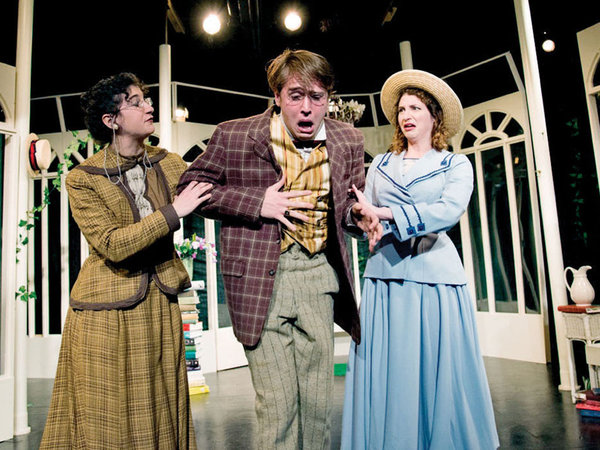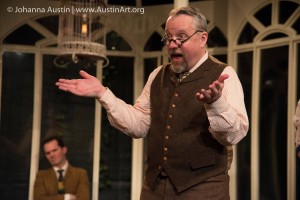
Intellectual theater is not in its heyday, and there is much agony against the “talky” play. Tina Brock’s production of MISALLIANCE for Idiopathic Ridiculopathy Consortium is swift and cleverly honed, and the second half in particular is all joy. The first half, with its ponderous monologues, confronts the problem of the garrulous play head-on.
MISALLIANCE is a kind of problem play. It’s neither one of George Bernard Shaw’s “important,” issue-forward pieces—Major Barbara, Mrs. Warren’s Profession—nor a straight-up farce. In this way, it gives a director a bit of a blank slate. The real difficulty, thought, is that the first half follows what was a new form at the time and is still mainly unheard-of: a meandering discussion of ideas among friends and family. Then a plane crashes through the greenhouse, bringing with it a few more characters, a bit of chaos and, most importantly, scandal.
Brock’s style is to take classic comedies—the kind we know, but that rarely get done—and present them with uncommon faithfulness to the author’s intention. The treat here is that we see what these plays are really about. We also see how much time has passed, and question whether these plays retain their relevance.
So Brock’s solution is character-based, and this production is at its best when the characters are outlandish, nearly clownish. The fun is in watching her actors reach for the outrageous unreality, and a few really nail it. Andrew Carroll daubs just the right measure of sinister plotting onto Bentley’s blubbery fits, and hits every laugh with delightful hysteria. Similarly on-the-button is Kristen Norine’s Lina, brings fierce good humor to the no-nonsense, dogmatic acrobat.

There is a delight, too, and even surprise, in Heather Cole’s hyperactive, manic Hypatia, and the ADD thoughtlessness of this child rings true—when Cole isn’t speaking too quickly for us to understand her.
There really isn’t a protagonist in the play, but the most substantial role is John Tarleton (David Bardeen), who is faced with a serious problem: he must publicly and repeatedly proclaim his love for his family, when he really feels nothing of the kind. He’s smart enough to recognize this periodically, but has no mental discipline, and is too frivolous to act on any of many ideas—the moment-to-moment digressions which Bardeen manages with excellent comic timing, and counterpoints with sufficient gravitas in his eventual emotional uproar.
Tarleton’s problem is the problem Shaw presents. Underneath the manic joy of his humor, and the outlandish, satirical characterizations, is an idea paradoxically commonplace and universally reviled: love, for all of its wonderful qualities, is a crapshoot, a competition, and even an invention, whether it’s between married couples or family.
Brock keeps these characters outlandish but likable. But in a medium fraught with love stories—where “important ideas” are hammered into the age-old question of who gets to sleep with whom—Shaw gleefully throws dirt into our eyes and says: yours is a sick obsession. [Walnut Street Theatre Studio 5, 825 Walnut St., Floor 5] January 28-February 22, 2015; idiopathicridiculopathyconsortium.org.
